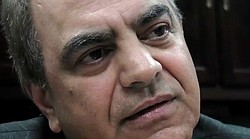Professor has different take on causes of unrest in Iran
By Harold Gwin
YSU’s Jalal Jalali says Iran’s young people are concerned about jobs and freedoms.
YOUNGSTOWN — Jalal Jalali believes the rioting and dissent occurring in Iran will be short-lived.
It’s not an effort to overthrow the Islamic Republic form of government, said the professor and chairman of electrical and computer engineering at Youngstown State University, who emigrated from Iran to the United States in 1976 but still has friends and family there.
Jalali believes the recent Iranian presidential election was just the trigger that unleashed the frustrations of the country’s younger population.
He said that 63 percent of the country’s residents have a college education, and the young people are frustrated that there aren’t more jobs and more freedoms for them to enjoy.
The unrest surfaced after President Mahmoud Ahmadinejad was declared the winner of the presidential election, defeating challenger Mir Hossein Mousavi.
Protesters took to the streets, and Mousavi declared the election was fraudulent, seeking a vote recount.
It doesn’t matter whether Ahmadinejad or Mousavi is president; the Islamic Republic won’t change, Jalali said, noting a stark difference between the current riots and the riots that preceded the Islamic Revolution in the country in 1979 that led to the creation of the Islamic Republic.
At that time, you found both young and old in the streets, calling for the ouster of the shah.
This time, 95 percent of the people seen in the street are under age 30, he said, suggesting that means there is no underlying movement to change the form of government.
Mustansir Mir, professor of Islamic studies at YSU, agreed with Jalali’s basic assessment of the situation.
“I think it’s a flash in the pan,” Mir said. The religious establishment won’t oust Ahmadinejad, and all Ahmadinejad needs right now is a breather, time to develop the country’s nuclear program which, if successful, would bring a rapid improvement in his popularity in Iran, Mir said.
The protests are a dispute over the presidency, and this is “a very temporary phase,” he said, adding, “I don’t think much will come of it.”
The government has heard the message of the younger generation, Jalali said. It’s heard the message and will find a better strategy to provide more jobs and more freedoms and defuse the situation, he predicted.
Many are pleased with the progress the post-revolution government has brought to Iran, he said. It built universities, encouraged young people to get an education, developed technology that has benefited the country and built up Iran’s infrastructure, he said.
Outside of Tehran, the majority of the people probably support Ahmadinejad, whose presidency represents those improvements, Jalali said.
The country hasn’t been able to provide the necessary balance between demand and production to create those jobs, and Mousavi has promised more freedom for the people to express themselves, something his supporters believe is lacking because they think their voices haven’t been heard, he said.
Much of what he knows about events occurring in Iran are from various media sources, Jalali said, noting that he’s seen no evidence of outside influence — from the United States or the United Nations — to encourage dissent in Iran.
President Barack Obama has exhibited the best possible strategy in dealing with the issue, Jalali said, supporting the president’s condemnation of the use of violence to quell the protestors while generally taking a hands-off approach to the internal issues.
There have been calls from Iran’s clerical hierarchy for harsh punishment for leaders of the demonstrations, but Jalali believes that would be a mistake.
That type of treatment can lead to a desire for revenge and continued violence, he cautioned.
The government needs to negotiate with the protesters, calm them and get them to think about the country’s future, he suggested.
Jalali said he doesn’t believe the protests represent any deep-seated fissures in Iranian society.
“I think the movement doesn’t have [a] base,” he said.
Mousavi didn’t move against the government but challenged the results of the election, which, as a candidate, he had grounds to do, he said.
“It’s basically politics,” said Jalali, who became a U.S. citizen about a decade ago. He pointed out that it’s not so different from some recent presidential elections in the United States in which there were questions of voter fraud and claims that the real winner didn’t get to take office.
gwin@vindy.com
 43
43

